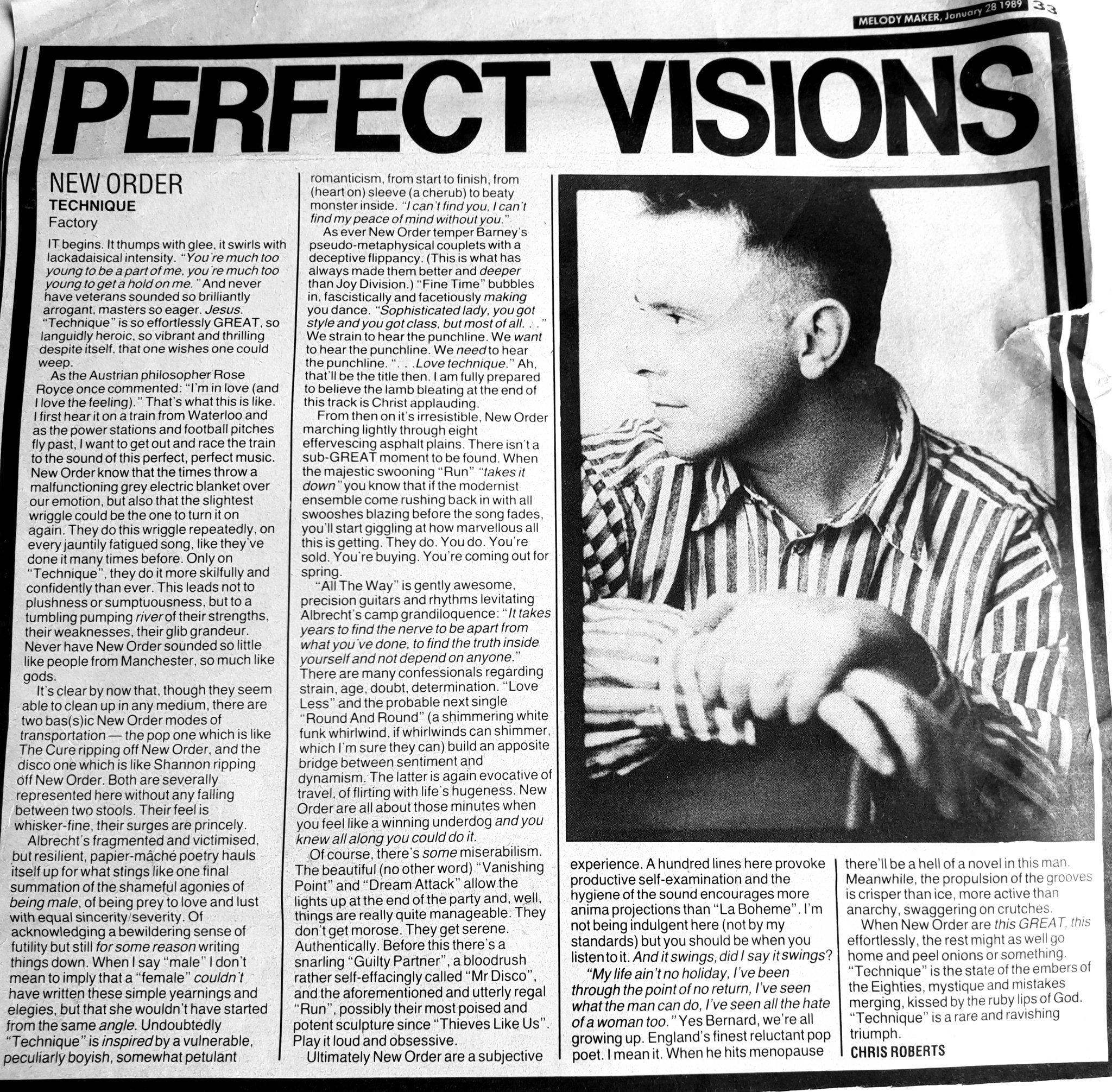1989 01 28 New Order "Technique" Review Melody Maker
PERFECT VISION
NEW ORDER
TECHNIQUE
Factory
IT begins. It thumps with glee, it swirls with lackadaisical intensity. “You're much too young to be a part of me, you're much too young to get a hold on me." And never have veterans sounded so brilliantly arrogant, masters so eager. Jesus. “Technique” is so effortlessly GREAT, so languidly heroic, so vibrant and thrilling despite itself, that one wishes one could weep.
As the Austrian philosopher Rose Royce once commented. “I’m in love (and I love the feeling). ” That’s what this is like. I first hear it on a train from Waterloo and as the power stations and football pitches fly past, I want to get out and race the train to the sound of this perfect, perfect music. New Order know that the times throw a malfunctioning grey electric blanket over our emotion, but also that the slightest wriggle could be the one to turn it on again. They do this wriggle repeatedly, on every jauntily fatigued song, like they've done it many times before. Only on "Technique”, they do it more skilfully and confidently than ever. This leads not to plushness or sumptuousness, but to a tumbling pumping river of their strengths, their weaknesses, their glib grandeur. Never have New Order sounded so little like people from Manchester, so much like gods.
It’s clear by now that, though they seem able to clean up in any medium, there are two bas(s)ic New Order modes of transportation — the pop one which is like The Cure ripping off New Order, and the disco one which is like Shannon ripping off New Order. Both are severally represented here without any falling between two stools. Their feel is whisker-fine, their surges are princely.
Albrecht's fragmented and victimised, but resilient, papier-mache poetry hauls itself up for what stings like one final summation of the shameful agonies of being male, of being prey to love and lust with equal sincerity severity. Of acknowledging a bewildering sense of futility but still for some reason writing things down. When I say “male” I don't mean to imply that a “female” couldn't have written these simple yearnings and elegies, but that she wouldn't have started from the same angle. Undoubtedly “Technique” is inspired by a vulnerable, peculiarly boyish, somewhat petulant romanticism, from start to finish, from (heart on) sleeve (a cherub) to beaty monster inside. "I can't find you, I can't find my peace of mind without you."
As ever New Order temper Barney's pseudo-metaphysical couplets with a deceptive flippancy. (This is what has always made them better and deeper than Joy Division.) "Fine Time” bubbles in, fascistically and facetiously making you dance. “Sophisticated lady, you got style and you got class, but most of all..." We strain to hear the punchline. We want to hear the punchline. We need to hear the punchline. “....Love technique." Ah, that’ll be the title then. I am fully prepared to believe the lamb bleating at the end of this track is Christ applauding.
From then on it's irresistible, New Order marching lightly through eight effervescing asphalt plains. There isn’t a sub-GREAT moment to be found. When the majestic swooning “Run” “takes it down" you know that if the modernist ensemble come rushing back in with all swooshes blazing before the song fades, you'll start giggling at how marvellous all this is getting. They do. You do. You’re sold. You're buying. You're coming out for spring.
"All The Way” is gently awesome, precision guitars and rhythms levitating Albrecht's camp grandiloquence: “It takes years to find the nerve to be apart from what you ve done, to find the truth inside yourself and not depend on anyone.” There are many confessionals regarding strain, age, doubt, determination. “Love Less” and the probable next single Round And Round" (a shimmering white funk whirlwind, if whirlwinds can shimmer, which I'm sure they can) build an apposite bridge between sentiment and dynamism. The latter is again evocative of travel, of flirting with life's hugeness. New Order are all about those minutes when you feel like a winning underdog and you knew all along you could do it.
Of course, there’s some miserabilism. The beautiful (no other word) “Vanishing Point” and “Dream Attack” allow the lights up at the end of the party and, well, things are really quite manageable. They don't get morose. They get serene. Authentically. Before this there's a snarling “Guilty Partner”, a blood rush rather self-effacingly called “Mr Disco”, and the aforementioned and utterly regal “Run", possibly their most poised and potent sculpture since "Thieves Like Us". Play it loud and obsessive.
Ultimately New Order are a subjective experience. A hundred lines here provoke productive self-examination and the hygiene of the sound encourages more anima projections than “La Boheme”. I’m not being indulgent here (not by my standards) but you should be when you listen to it. And it swings, did I say it swings'?
“My life ain’t no holiday, I've been through the point of no return, I’ve seen what the man can do, I’ve seen all the hate of a woman too." Yes Bernard, we’re all growing up. England’s finest reluctant pop poet. I mean it. When he hits menopause there'll be a hell of a novel in this man. Meanwhile, the propulsion of the grooves is crisper than ice, more active than anarchy, swaggering on crutches.
When New Order are this GREAT, this effortlessly, the rest might as well go home and peel onions or something. “Technique” is the state of the embers of the Eighties, mystique and mistakes merging, kissed by the ruby lips of God. “Technique” is a rare and ravishing triumph.
CHRIS ROBERTS

Comments
Post a Comment